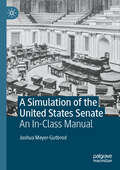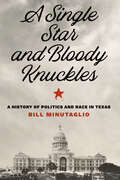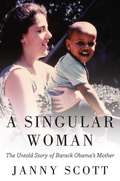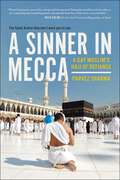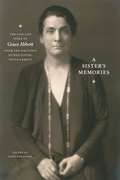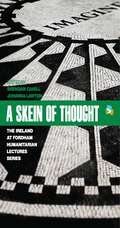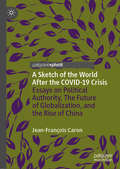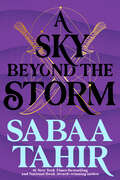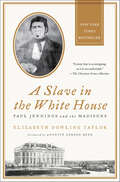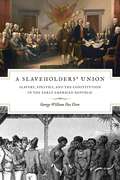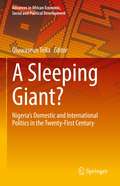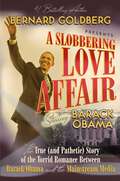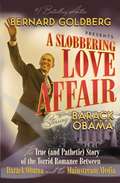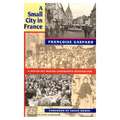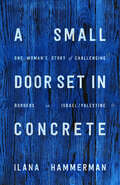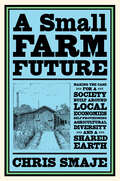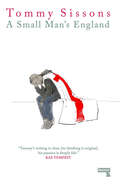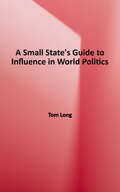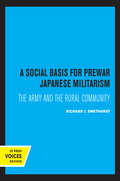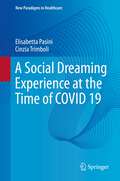- Table View
- List View
A Simple Stochastic Approach to Debt Sustainability Applied to Lebanon
by Edward Gardner Julian Di GiovanniA report from the International Monetary Fund.
A Simulation of the United States Senate: An In-Class Manual
by Joshua Meyer-GutbrodThis book serves as a manual for students enrolled in semester-long US Senate simulations. The simulation tasks students with representing a particular state while inheriting a particular Senator’s voting history. Students then engage with their peers to write, introduce, mark up, debate, and adopt legislation, within an environment where the instructional staff play the key roles of the House of Representatives, the President, the Press, and public interest groups. The manual and simulation experience are designed to supplement classes on Congress and the Presidency and the political process. Building on the innovation of experiential learning opportunities, this book facilitates the connection of complex theoretical concepts to real-world applications through student reflection.
A Single Star and Bloody Knuckles: A History of Politics and Race in Texas
by Bill MinutaglioFor John Nance &“Cactus Jack&” Garner, there was one simple rule in politics: &“You&’ve got to bloody your knuckles.&” It&’s a maxim that applies in so many ways to the state of Texas, where the struggle for power has often unfolded through underhanded politicking, backroom dealings, and, quite literally, bloodshed. The contentious history of Texas politics has been shaped by dangerous and often violent events, and been formed not just in the halls of power but by marginalized voices omitted from the official narratives. A Single Star and Bloody Knuckles traces the state&’s conflicted and dramatic evolution over the past 150 years through its pivotal political players, including oft-neglected women and people of color. Beginning in 1870 with the birth of Texas&’s modern political framework, Bill Minutaglio chronicles Texas political life against the backdrop of industry, the economy, and race relations, recasting the narrative of influential Texans. With journalistic verve and candor, Minutaglio delivers a contemporary history of the determined men and women who fought for their particular visions of Texas and helped define the state as a potent force in national affairs.
A Single Tear: A Family's Persecution, Love, And Endurance In Communist China
by Ningkun Wu Yikai LiProfessor Wu, educated in the U.S., relates his prison experiences in a Chinese labor farm after being labeled an "ultrarightist" by his academic colleagues at Beijing University
A Singular Woman
by Janny ScottWatch a video A major publishing event: an unprecedented look into the life of the woman who most singularly shaped Barack Obama-his mother. Barack Obama has written extensively about his father, but little is known about Stanley Ann Dunham, the fiercely independent woman who raised him, the person he credits for, as he says, "what is best in me. " Here is the missing piece of the story. Award-winning reporter Janny Scott interviewed nearly two hundred of Dunham's friends, colleagues, and relatives (including both her children), and combed through boxes of personal and professional papers, letters to friends, and photo albums, to uncover the full breadth of this woman's inspiring and untraditional life, and to show the remarkable extent to which she shaped the man Obama is today. Dunham's story moves from Kansas and Washington state to Hawaii and Indonesia. It begins in a time when interracial marriage was still a felony in much of the United States, and culminates in the present, with her son as our president- something she never got to see. It is a poignant look at how character is passed from parent to child, and offers insight into how Obama's destiny was created early, by his mother's extraordinary faith in his gifts, and by her unconventional mothering. Finally, it is a heartbreaking story of a woman who died at age fifty-two, before her son would go on to his greatest accomplishments and reflections of what she taught him. .
A Singular Woman: The Untold Story of Barack Obama's Mother
by Janny ScottAn unprecedented look into the life of the woman who most singularly shaped Barack Obama--his mother. Barack Obama has written extensively about his father, but little is known about Stanley Ann Dunham, the fiercely independent woman who raised him, the person he credits for, as he says, "what is best in me." Here is the missing piece of the story. Award-winning reporter Janny Scott interviewed nearly two hundred of Dunham's friends, colleagues, and relatives (including both her children), and combed through boxes of personal and professional papers, letters to friends, and photo albums, to uncover the full breadth of this woman's inspiring and untraditional life, and to show the remarkable extent to which she shaped the man Obama is today. Dunham's story moves from Kansas and Washington state to Hawaii and Indonesia. It begins in a time when interracial marriage was still a felony in much of the United States, and culminates in the present, with her son as our president-- something she never got to see. It is a poignant look at how character is passed from parent to child, and offers insight into how Obama's destiny was created early, by his mother's extraordinary faith in his gifts, and by her unconventional mothering. Finally, it is a heartbreaking story of a woman who died at age fifty-two, before her son would go on to his greatest accomplishments and reflections of what she taught him.
A Sinner in Mecca: A Gay Muslim's Hajj of Defiance
by Parvez SharmaFrom the recipient of a 2018 Guggenheim Fellow Based on the New York Times' Critic Pick documentary "The first book about the Hajj from a gay perspective, written by a man with a deep knowledge of Islamic history. This pilgrimage is the centerpiece of his book, and he recounts it with courage and fierce emotion." —The Guardian This is the Islam you've never been allowed to see. Daringly reported from its frontlines and forbidden to most of humanity for centuries. The Hajj pilgrimage is a journey every Muslim is commanded by God to go on at least once in a lifetime if they are able and, like millions, Parvez Sharma believes his spiritual salvation lies at Islam's ground zero, Mecca. But unlike the journeys of his fellow Muslims, the consequences of his own could be deadly. In A Sinner in Mecca, author, filmmaker, and 2018 Guggenheim Fellow Parvez chronicles his pilgrimage as a very openly gay Muslim to Saudi Arabia, where Islam's heart beats . . . and where being true to himself is punishable by death. Risking his life, Parvez embarks on a Jihad of the self—filming his experience along the way. Already under fire for his documentary A Jihad for Love, which looks at the coexistence of Islam and homosexuality, he would undoubtedly face savage punishment if exposed—from being thrown off a cliff to public beheading. Parvez's odyssey is at once audacious, global, and remarkable. He meets everyone from extremists to explorers of the spiritual kind and the world they open up is frightening . . . yet breathtaking. In Mecca, Parvez comes out to a pilgrim, who then asks him why he would want to be part of something that wants no part of him. This book is his answer to this question and many more. Parvez provides an unflinching look at our troubling unfolding history, including Hizbullah, ISIS, Trump, the race-wars, an embattled Europe, and more. He offers real solutions, borne of his efforts to get his hands dirty to find them. This is a lived history—and its author is no armchair theorist. Following the New York Times Critics' Pick hit documentary of the same title, A Sinner in Mecca unflinchingly showcases parts of the dangerous ideology that governs today's ISIS and how much it has in common with Saudi Arabia's sacred, yet treacherous dogma, Wahhabi Islam. A Sinner in Mecca is simultaneously one man's personal odyssey as well as a groundbreaking, provocative revelation of a clandestine world and its fastest growing and most contested religion.
A Sister's Memories: The Life and Work of Grace Abbott from the Writings of Her Sister, Edith Abbott
by John SorensenAmong the great figures of Progressive Era reform, Edith and Grace Abbott are perhaps the least sung. Peers, companions, and coworkers of legendary figures such as Jane Addams and Sophonisba Breckinridge, the Abbott sisters were nearly omnipresent in turn-of-the-century struggles to improve the lives of the poor and the working-class people who fed the industrial engines and crowded into diverse city neighborhoods. Grace's innovative role as a leading champion for the rights of children, immigrants, and women earned her a key place in the history of the social justice movement. As her friend and colleague Eleanor Roosevelt wrote, Grace was "one of the great women of our day . . . a definite strength which we could count on for use in battle. " A Sister's Memories is the inspiring story of Grace Abbott (1878-1939), as told by her sister and social justice comrade, Edith Abbott (1876-1957). Edith recalls in vivid detail the Nebraska childhood, impressive achievements, and struggles of her sister who, as head of the Immigrants' Protective League and the U. S. Children's Bureau, championed children's rights from the slums of Chicago to the villages of Appalachia. Grace's crusade can perhaps be best summed up in her well-known credo: "Justice for all children is the high ideal in a democracy. " Her efforts saved the lives of thousands of children and immigrants and improved those of millions more. These trailblazing social service works led the way to the creation of the Social Security Act and UNICEF and caused the press to nickname her "The Mother of America's 43 Million Children. " She was the first woman in American history to be nominated to the presidential cabinet and the first person to represent the United States at a committee of the League of Nations. Edited by Abbott scholar John Sorensen, A Sister's Memories is destined to become a classic. It shapes the diverse writings of Edith Abbott into a cohesive narrative for the first time and fills in the gaps of our understanding of Progressive Era reforms. Readers of all backgrounds will find themselves engrossed by this history of the unstoppable, pioneer feminist Abbott sisters.
A Skein of Thought: The Ireland at Fordham Humanitarian Lecture Series (International Humanitarian Affairs)
by Brendan Cahill and Johanna LawtonThis book is the result of a strong collaboration between the Permanent Mission of Ireland to the United Nations and Fordham University’s Institute of International Humanitarian Affairs. It is a record of a series of distinguished lectures that explored the current challenges to policymakers and humanitarian actors as they focus their efforts on larger and more complex emergencies. The contributors to this book both identify innovative measures in addressing established problems and address hitherto under-researched emerging issues. A Skein of Thought is the product of this fruitful partnership. Ireland has, through its longstanding peacekeeping, its embrace of multi-lateralism, and its investment in development and humanitarian solutions, been a global leader in confronting and mitigating global disasters. In a similar way, the Institute of International Humanitarian Affairs has been a global leader in humanitarian training, publications, and research. A Skein of Thought: The Ireland at Fordham Humanitarian Lecture Series, then, represents this link between theory and practice.The Refuge PressThe Refuge Press is an independent humanitarian imprint that was founded in 2019. Following on from a successful International Humanitarian Affairs Series through Fordham University Press, The Refuge Press, with Brendan Cahill as its Publisher, publishes four books per year. The Refuge Press books challenge humanitarian thinking and offer personal and professional reflections on global crises.
A Sketch of the World After the COVID-19 Crisis: Essays on Political Authority, The Future of Globalization, and the Rise of China
by Jean-François CaronThis book tries to understand the lessons we ought to learn from the Covid-19 crisis as well as the profound transformations this pandemic will bring to the world order. These essays explore the challenge that the pandemic poses to liberalism, the unique potential this crisis offers us to retake control over globalization, and how it foreshadows future conflicts, especially the dynamic between China and the West. This timely book will be of interest to scholars in Political Science and philosophy, as well as to general readers interested in what the post Covid-19 world may resemble.
A Sky Beyond the Storm (An Ember in the Ashes #4)
by Sabaa TahirPrepare for the jaw-dropping finale of Sabaa Tahir's beloved New York Times bestselling An Ember in the Ashes fantasy series, and discover: Who will survive the storm?Picking up just a few months after A Reaper at the Gates left off...The long-imprisoned jinn are on the attack, wreaking bloody havoc in villages and cities alike. But for the Nightbringer, vengeance on his human foes is just the beginning. By his side, Commandant Keris Veturia declares herself Empress, and calls for the heads of any and all who defy her rule. At the top of the list? The Blood Shrike and her remaining family.Laia of Serra, now allied with the Blood Shrike, struggles to recover from the loss of the two people most important to her. Determined to stop the approaching apocalypse, she throws herself into the destruction of the Nightbringer. In the process, she awakens an ancient power that could lead her to victory—or to an unimaginable doom.And deep in the Waiting Place, the Soul Catcher seeks only to forget the life—and love—he left behind. Yet doing so means ignoring the trail of murder left by the Nightbringer and his jinn. To uphold his oath and protect the human world from the supernatural, the Soul Catcher must look beyond the borders of his own land. He must take on a mission that could save—or destroy—all that he knows.
A Slave in the White House: Paul Jennings and the Madisons
by Elizabeth Dowling TaylorNew York Times Bestseller: A &“fascinating portrait&” of one of the men enslaved by James and Dolley Madison, and his journey toward freedom (Publishers Weekly). Paul Jennings was born into slavery on the plantation of James and Dolley Madison in Virginia, later becoming part of the Madison household staff at the White House. Once he was finally emancipated by Senator Daniel Webster later in life, he would give an aged and impoverished Dolley Madison, his former owner, money from his own pocket, write the first White House memoir, and see his sons fight with the Union Army in the Civil War. He died a free man in northwest Washington at seventy-five. Based on correspondence, legal documents, and journal entries rarely seen before, this amazing portrait of the times reveals the mores and attitudes toward slavery of the nineteenth century, and sheds new light on famous figures such as James Madison, who believed the white and black populations could not coexist as equals; General Lafayette, who was appalled by this idea; Dolley Madison, who ruthlessly sold Paul after her husband&’s death; and many other since-forgotten slaves, abolitionists, and civil right activists. &“A portrait of a remarkably willful, ambitious, opportunistic, and in his own way well-connected American. You could also call it the American dream.&” —Fortune &“A great historical biography.&” —Houston Style Magazine &“A must-read.&” —The Daily Beast &“Thorough research . . . an important story of human struggle, determination, and triumph.&” —The Dallas Morning News
A Slaveholders' Union: Slavery, Politics, and the Constitution in the Early American Republic
by George William Van CleveAfter its early introduction into the English colonies in North America, slavery in the United States lasted as a legal institution until the passage of the Thirteenth Amendment to the Constitution in 1865. But increasingly during the contested politics of the early republic, abolitionists cried out that the Constitution itself was a slaveowners’ document, produced to protect and further their rights. A Slaveholders’ Union furthers this unsettling claim by demonstrating once and for all that slavery was indeed an essential part of the foundation of the nascent republic. In this powerful book, George William Van Cleve demonstrates that the Constitution was pro-slavery in its politics, its economics, and its law. He convincingly shows that the Constitutional provisions protecting slavery were much more than mere “political” compromises—they were integral to the principles of the new nation. By the late 1780s, a majority of Americans wanted to create a strong federal republic that would be capable of expanding into a continental empire. In order for America to become an empire on such a scale, Van Cleve argues, the Southern states had to be willing partners in the endeavor, and the cost of their allegiance was the deliberate long-term protection of slavery by America’s leaders through the nation’s early expansion. Reconsidering the role played by the gradual abolition of slavery in the North, Van Cleve also shows that abolition there was much less progressive in its origins—and had much less influence on slavery’s expansion—than previously thought. Deftly interweaving historical and political analyses, A Slaveholders’ Union will likely become the definitive explanation of slavery’s persistence and growth—and of its influence on American constitutional development—from the Revolutionary War through the Missouri Compromise of 1821.
A Sleeping Giant?: Nigeria’s Domestic and International Politics in the Twenty-First Century (Advances in African Economic, Social and Political Development)
by Oluwaseun TellaThis edited volume explores Nigeria’s domestic and international politics and its implications for the country’s national development and international status. Coinciding with the twenty year anniversary of Nigeria’s return to democratic rule, this volume considers the state of democracy in Nigeria and examines its successes and challenges with a view towards offering possible solutions for the country’s future development. The first half of the volume addresses domestic politics, focusing on current issues such as the 2019 elections, Nigerian federalism, media, state-civil society relations, and Boko Haram terrorism. The second half looks at Nigeria’s relations with its African neighbors, discussing the relationships between Nigeria and South Africa, Egypt, Ghana, and Cameroon, among others. Engaging the full spectrum of the politics of a rising African power, this volume will be of interest to students and researchers of comparative politics, international relations, foreign policy, African studies, regional politics, peace, security, conflict, and development studies, as well as African policymakers.
A Slobbering Love Affair: The True (and Pathetic) Story Of The Torrid Romance Between Barack Obama And The Mainstream Media
by Bernard GoldbergNew York Times bestselling author Bernard Goldberg argues that the left-leaning mainstream media crossed the line during the 2008 presidential election campaign and helped to determine the outcome.
A Slobbering Love Affair: The True (and Pathetic) Story of the Torrid Romance Between Barack Obama and the Mainstream Media
by Bernard GoldbergThis Time They Went Beyond Bias. From the day Barack Obama announced his candidacy to the moment he took the oath of office, the mainstream media fawned over him like love-struck school girls. Even worse, this time they went beyond media bias to media activism, says CBS veteran and #1 bestselling author Bernard Goldberg. In his most provocative book yet, A Slobbering Love Affair, Goldberg shows how the mainstream media's hopelessly one-sided coverage of President Obama has shredded America's trust in journalism and endangered our free society. Highlighting the media's laughable coverage and shameless hypocrisy, Goldberg exposes how liberal reporters ignored important issues, focused on trivial matters, and attacked those who dared to question "The One." Goldberg also argues that the media's blatant disregard for their traditional role as the fourth estate and government watchdog has endangered America and eroded the notion of a free and fair press.
A Small Circus: A Novel
by Hans FalladaIt is the summer of 1929, and in a small German town, a storm is brewing.Tredup, a shabby reporter working for the Pomeranian Chronicle, leads a precarious existence . . . until he takes some photographs that offer him a chance to make a fortune.While Tredup contemplates his next move, the town is buzzing. Farmers are plotting their revenge against greedy officials, a mysterious traveling salesman is stirring up trouble, and all the while, the Nazi party grows stronger as the Communists fight them in the street.As the town slowly slips into chaos, Mayor "Fatty” Gareis does everything in his power to seek the easy life.As tensions mount between workers and bosses, town and country, and Left and Right, alliances are broken, bribes are taken, and plots are hatched, until the tension spills over into violence.From the brilliant mind of one of Germany’s most celebrated writers, A Small Circus is a genuine and frightening tale of small-town Germany during a time of unrest. It belongs in the collection of every reader who has enjoyed his break-out classics.Skyhorse Publishing, as well as our Arcade, Yucca, and Good Books imprints, are proud to publish a broad range of books for readers interested in fiction-novels, novellas, political and medical thrillers, comedy, satire, historical fiction, romance, erotic and love stories, mystery, classic literature, folklore and mythology, literary classics including Shakespeare, Dumas, Wilde, Cather, and much more. While not every title we publish becomes a New York Times bestseller or a national bestseller, we are committed to books on subjects that are sometimes overlooked and to authors whose work might not otherwise find a home.
A Small City In France
by Arthur Goldhammer Eugen Weber Françoise GaspardThe picturesque town of Dreux, 60 miles west of Paris, quietly entered history in 1821, when Victor Hugo won the hand of his beloved there. Another century and a half would pass before the town made history again, but this time there was nothing quiet about it. In 1983, Jean-François Le Pen's National Front candidates made a startling electoral gain in the Dreux region. Its liberal traditions had ended abruptly. With the radical right controlling the municipal council and the deputy mayor's office, Dreux became the forerunner of neofascist advances all across the nation. How could it happen? <p><p> A trained historian, Gaspard was born in Dreux and served as the city's socialist mayor from 1977 to 1983. She brings this experience to bear in her study, giving us an evocative picture of the town in all its particularity and at the same time fitting it into the broader context. Local history, collective memory, political life, the role of personality, partisanship, and rumor, the claims of newcomers and oldtimers, Muslims and Catholics: Gaspard sifts through these factors as she crafts a clear and rousing account of the conditions that brought the National Front to power. Viewed amid the explosive consequences of recent demographic and economic transformations, Dreux, with a population of about 30,000, is facing big-city problems: class conflict, unemployment, racism. This is a book about the decline of small-town "virtues" and, more ominously, the democratic ideal in France. With its disturbing implications for other European nations and the United States, it could well be a parable for our time.
A Small Door Set in Concrete: One Woman's Story of Challenging Borders in Israel/Palestine
by Ilana Hammerman“I was taught from the start not to be silent.” For years, renowned activist and scholar Ilana Hammerman has given the world remarkable translations of Kafka. With A Small Door Set in Concrete, she turns to the actual surreal existence that is life in the West Bank after decades of occupation. After losing her husband and her sister, Hammerman set out to travel to the end of the world. She began her trip with the hope that it would reveal the right path to take in life. But she soon realized that finding answers was less important than experiencing the freedom to move from place to place without restriction. Hammerman returned to the West Bank with a renewed joie de vivre and a resolution: she would become a regular visitor to the men, women, and children who were on the other side of the wall, unable to move or act freely. She would listen to their dreams and fight to bring some justice into their lives.A Small Door Set in Concrete is a moving picture of lives filled with destruction and frustration but also infusions of joy. Whether joining Palestinian laborers lining up behind checkpoints hours before the crack of dawn in the hope of crossing into Israel for a day’s work, accompanying a family to military court for their loved one’s hearing, or smuggling Palestinian children across borders for a day at the beach, Hammerman fearlessly ventures into territories where few Israelis dare set foot and challenges her readers not to avert their eyes in the face of injustice. Hammerman neither preaches nor politicks. Instead, she engages in a much more personal, everyday kind of activism. Hammerman is adept at revealing the absurdities of a land where people are stripped of their humanity. And she is equally skilled at illuminating the humanity of those caught in this political web. To those who have become simply statistics or targets to those in Israel and around the world, she gives names, faces, dreams, desires. This is not a book that allows us to sit passively. It is a slap in the face, a necessary splash of cold water that will reawaken the humanity inside all of us.
A Small Farm Future: Making the Case for a Society Built Around Local Economies, Self-Provisioning, Agricultural Diversity and a Shared Earth
by Chris SmajeIn a time of looming uncertainties, what would a truly resilient society look like? In a groundbreaking debut, farmer and social scientist Chris Smaje argues that organising society around small-scale farming offers the soundest, sanest and most reasonable response to climate change and other crises of civilisation—and will yield humanity’s best chance at survival. Drawing on a vast range of sources from across a multitude of disciplines, A Small Farm Future analyses the complex forces that make societal change inevitable; explains how low-carbon, locally self-reliant agrarian communities can empower us to successfully confront these changes head on; and explores the pathways for delivering this vision politically. Challenging both conventional wisdom and utopian blueprints, A Small Farm Future offers rigorous original analysis of wicked problems and hidden opportunities in a way that illuminates the path toward functional local economies, effective self-provisioning, agricultural diversity and a shared earth.
A Small Farm Future: Making the Case for a Society Built Around Local Economies, Self-Provisioning, Agricultural Diversity and a Shared Earth
by Chris SmajeA modern classic of the new agrarianism"Chris Smaje...shows that the choice is clear. Either we have a small farm future, or we face collapse and extinction."—Vandana Shiva"Every young person should read this book."—Richard HeinbergIn a groundbreaking debut, farmer and social scientist Chris Smaje argues that organizing society around small-scale farming offers the soundest, sanest and most reasonable response to climate change and other crises of civilisation—and will yield humanity&’s best chance at survival.Drawing on a vast range of sources from across a multitude of disciplines, A Small Farm Future analyses the complex forces that make societal change inevitable; explains how low-carbon, locally self-reliant agrarian communities can empower us to successfully confront these changes head on; and explores the pathways for delivering this vision politically.Challenging both conventional wisdom and utopian blueprints, A Small Farm Future offers rigorous original analysis of wicked problems and hidden opportunities in a way that illuminates the path toward functional local economies, effective self-provisioning, agricultural diversity and a shared earth.Perfect for readers of both Wendell Berry and Thomas Piketty, A Small Farm Future is a refreshing, new outlook on a way forward for society—and a vital resource for activists, students, policy makers, and anyone looking to enact change.
A Small Man's England
by Tommy SissonsAn exploration of white working-class English men, showing how and why some have been captured by the far-right and what the left can do about it.IS THE WHITE WORKING CLASS RIGHT-WING? AND IS IT RIGHT-WING TO EVEN SPEAK OF A "WHITE WORKING CLASS"? In recent decades, as class consciousness has been suppressed and eroded, many white working-class men have turned their backs on the left in favour of the right and the far-right. Why is this? A Small Man's England is a polemic aimed at the structures of hierarchy that ceaselessly maintain power across Britain and elsewhere, and a call for multicultural solidarity amongst the working class. In analysing the roles that class, race, masculinity and nationality play in neoliberal Britain, Sissons offers a solution to the indoctrination of white working-class English men by the right and the far-right, and explores how working-class people can collectively shape a "Common England" -- a country based on equality and justice for all.
A Small State's Guide to Influence in World Politics
by Tom LongA complete guide for how small states can be strikingly successful and influential--if they assess their situations and adapt their strategies. Small states are crucial actors in world politics. Yet, they have been relegated to a second tier of International Relations scholarship. In A Small State's Guide to Influence in World Politics, Tom Long shows how small states can identify opportunities and shape effective strategies to achieve their foreign policy goals. To do so, Long puts small states' relationships at the center of his approach. Although small states are defined by their position as materially weaker actors vis-a-vis large states, Long argues that this condition does not condemn them to impotence or irrelevance. Drawing on typological theory, Long builds an explanation of when and how small states might achieve their goals. The book assesses a global range of cases successes and failures and offers a set of tools for scholars and policymakers to understand how varying international conditions shape small states' opportunities for influence.
A Social Basis for Prewar Japanese Militarism: The Army and the Rural Community (Publications of the Center for Japanese and Korean Studies)
by Richard J. SmethurstThis title is part of UC Press's Voices Revived program, which commemorates University of California Press’s mission to seek out and cultivate the brightest minds and give them voice, reach, and impact. Drawing on a backlist dating to 1893, Voices Revived makes high-quality, peer-reviewed scholarship accessible once again using print-on-demand technology. This title was originally published in 1984.
A Social Dreaming Experience at the Time of COVID 19 (New Paradigms in Healthcare)
by Elisabetta Pasini Cinzia TrimboliThe book describes the experience of four Social Dreaming Matrices held online between March and May 2020, during the first lockdown caused by the Covid 19 emergency. The pandemic isolated us and imposed prolonged contact with ourselves and our solitary thoughts. Against this backdrop, there was hope for change, a desire for a different kind of sociability and different forms of intimacy. On the basis of this evidence, our research supports the shift "from experiencing trauma to reacting to trauma", looking at a collective traumatic experience not only as something to be overcome but as an opportunity for a transformation that changes our mental schemes in relation to the external context. We have identified Social Dreaming as a privileged technique to overcome a collective traumatic experience, supporting its elaboration through collective feelings, new connections between intuition and rational thought, the discovery of community meanings. The authors's thesis is that the much-needed transition from 'magical thinking' to 'transformative thinking' takes place in a setting that is able to contain the anxieties of life's transitional phases, supporting the creation of new rituals and new social bonds and sustaining the passage from “me” to a “wider we”.

